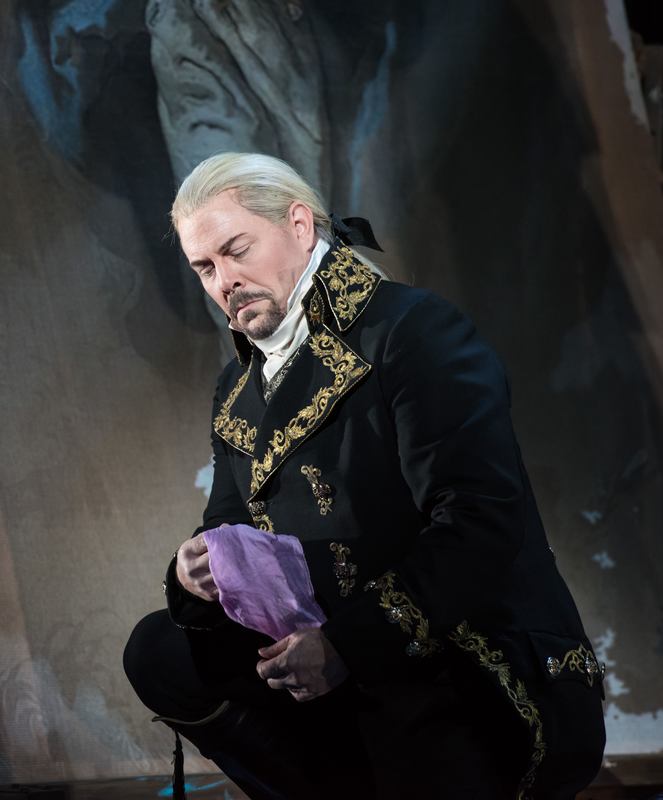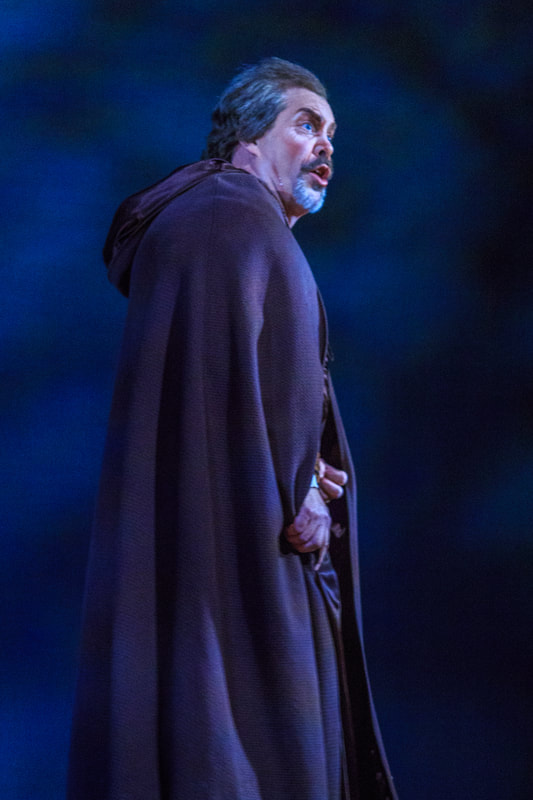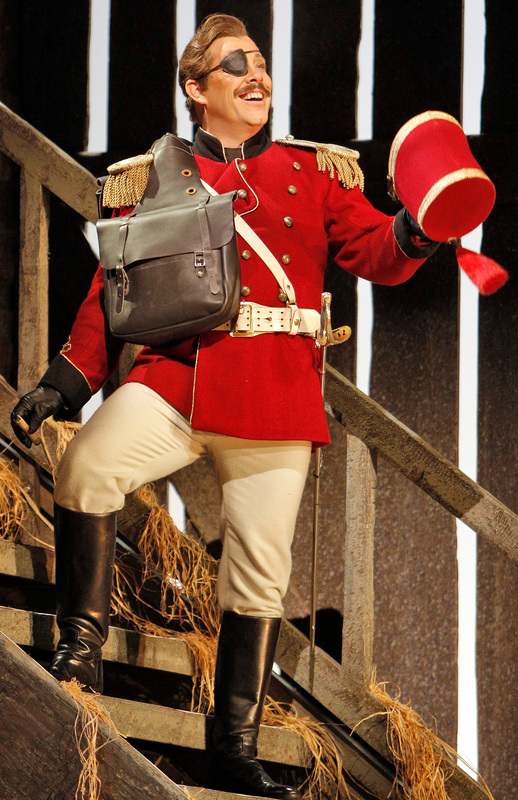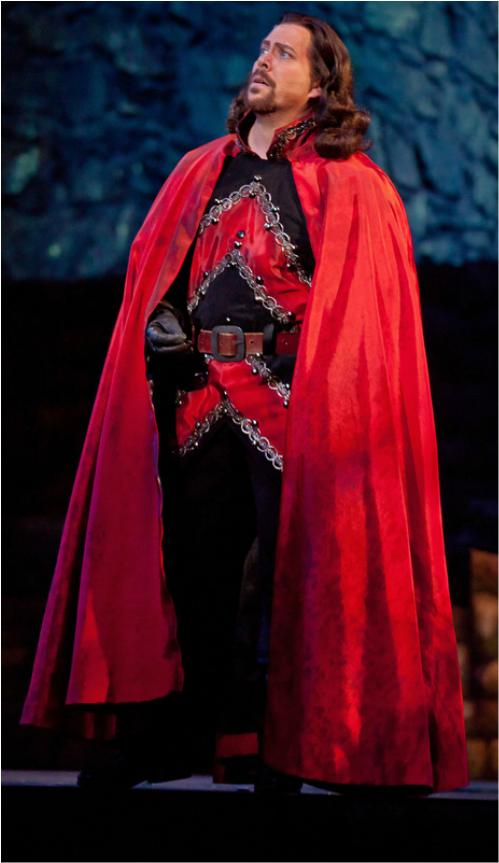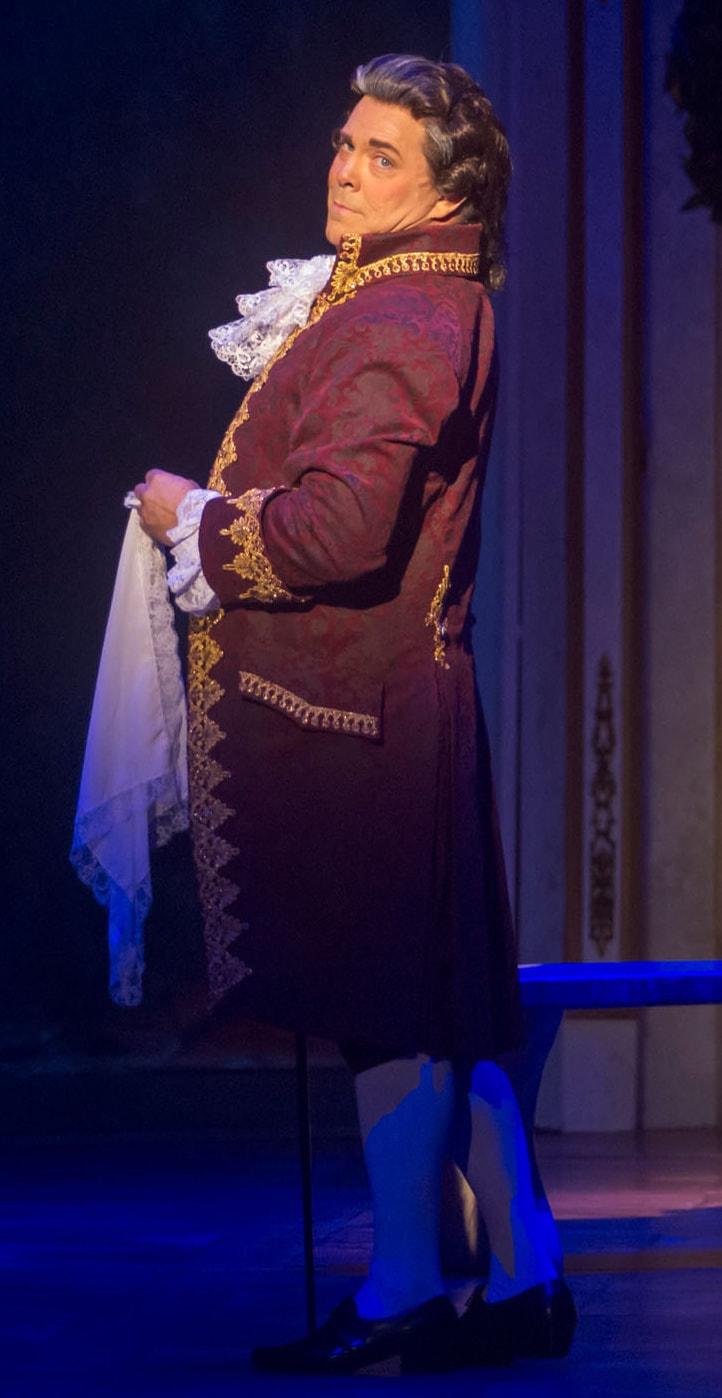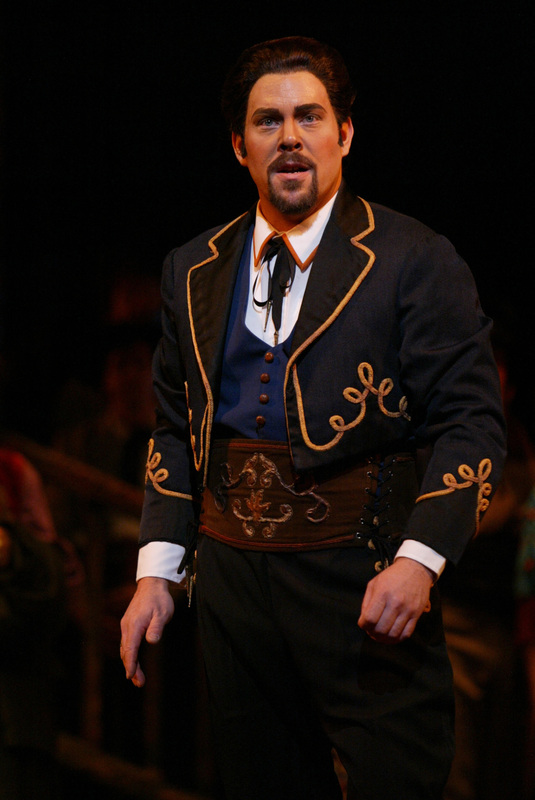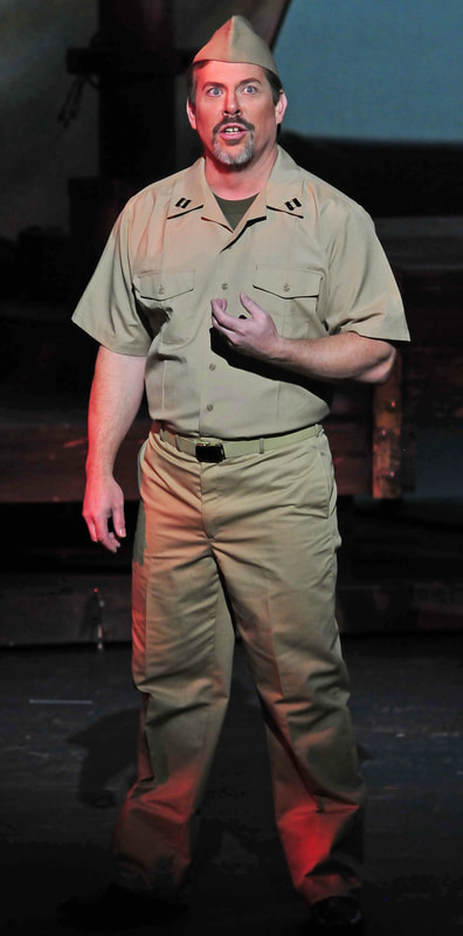PressMalcolm MacKenzie, baritone, brought seductive life to the villainous character and chief of police, Scarpia. His detestable allure illustrated the captivating nature of the wicked officer, but it was his deep and powerful voice that earned him the evening’s initial standing ovation when he returned to the stage for his bow. -Drew Neneman, World Herald Correspondent Omaha.com
The real stars of the production, however, were the two male principals, Scarpia and Cavaradossi. In his Opera Omaha and role debut, baritone Malcolm MacKenzie, Scarpia, was a commanding force from the moment he entered in Act I. His rich, warm, and dark tone was bolstered by a relentless legato line which amplified the sensuous sleaziness of his Scarpia. -Kevin Hanrahan, Opera News MacKenzie played the role with a deftness that seemed like it should be impossible to achieve with the large gestures required to reach to the back of an auditorium. He relayed the subtle difference between Rigoletto’s brash early jesting and his forced bravado as he frantically searches the Duke’s home for his daughter, as well as his hesitation and growing shame as he sits close-but-not-too-close when he finally finds her. And, of course, Mackenzie's voice was just as expressive. His rich baritone filled the room, rising over the chorus in the crowded palace scenes. -Elizabeth Szypulski, Indy Week Malcolm MacKenzie's first lines as Rigoletto quickly established his rich, freely produced baritone as one to savor in the part. His assured negotiation of the character's punishing high tessitura continued to thrill throughout the lengthy role. -Roy C. Dicks, CVNC Online The true star of the show, of course, is the barber himself — Figaro. Sung by dramatic baritone Malcolm MacKenzie, this Figaro flourished with charm, wit and just enough bravado to make him much adored by his audience. MacKenzie’s flirtatious exuberance joined brilliantly with his sizable voice, particularly in his upper extension, and crystal clear diction made for an immensely entertaining “Largo al factotum.” -Alison Kaufman, The Register-Guard And one of the most powerful moments of the night came from the smaller role of baritone Malcolm MacKenzie as Uncle John, singing “Little Dead Moses.” It was a visceral performance, MacKenzie holding to pitches and phrases while pressing at the edge of yelling and crying. -George Grella, New York Classical Review Baritone Malcolm MacKenzie, as (Hester) Prynne's ever-angry husband Chillingworth, produced a confident baritone and a dynamic presence. -Matthew Staver, Opera News Malcolm MacKenzie’s dignified baritone makes Chillingworth a ramrod-straight, implacable force, riven with self-loathing." -Joanne Sydney Lessner, Opera News A convincing, sympathetic George dramatically, Malcolm MacKenzie brought linear solidity and an impressive upper register to his music. -David Shengold, Opera News Mr. MacKenzie’s affectionate gestures toward Violetta even as he demands an end to her romance are key to his multi-layered portrayal of a man often played as a two-dimensional villain. Mr. MacKenzie’s supple baritone and beautiful diction and phrasing also put his Old Germont in a more provocative light. -Terry Ponick, Communities Digital News MacKenzie's confident, commanding Count di Luna raised the level of dramatic intensity whenever he strode onstage. His musical performance reached its apex in an "Il balen" of robust tone, ardent address, arching phrases and genuine baritonal squillo. - Louise T. Guinther, Opera News Malcolm MacKenzie makes his Fort Worth Opera debut by singing the role of the Count. Visually, he is everything a villain should be: thin, pale and goateed. Musically, he backs that up with a deep, rich baritone. Far too often, it is easy in opera to make the bad guy a tintype cliché; MacKenzie easily moves beyond that stereotype and makes the role of the Count quite human, with his conflicts and doubts roiling beneath the surface. – John Norine Jr., Theaterjones.com Malcolm MacKenzie was a stentorian Germont, singing with a steely beauty that matched the character's resolve. - Joanne Sydney Lessner, Opera News Malcolm MacKenzie brought his hardy baritone voice and dramatic authority to the role of Alfredo’s father, Germont. – Anthony Tommasini, NY Times MacKenzie, who possesses considerable comic ability, strutted and preened and used Belcore's range to great vocal advantage, especially in "Come Paride vezzoso." -Charlene Baldridge, Opera News As Sergeant Belcore, American baritone Malcolm MacKenzie offered more vocal muscle than this bel canto role requires, but the splendor of his instrument justifies such a mild indulgence. His ostentatious bravado took the sergeant’s self-confidence up several notches, but perhaps Director Stephen Lawless is responsible for this take on Belcore. A regular with the company for the last six seasons, MacKenzie has proved a treasure in every musical style he undertakes. - Ken Herman, sandiegostory.com The Act 2 confrontation between the desperately ill heroine and her lover’s father, Giorgio, is the work’s dramatic linchpin and in that role baritone Malcolm MacKenzie was outstanding. His plea to Violetta to spare his family’s respectability was splendid, wringing every tender morsel from a beautifully sung “pura sicomme un angelo.” His subsequent duet with Dunleavy was moving, and his famous recollection of home to his son was filled with warmth of color and tone. – Stephen G. Landesman, Press & Sun-Bulletin Baritone Malcolm MacKenzie was both tough and likable as Sharpless, the American Consul. One sensed his moral dilemma. - David Gregson, Opera News [As Sharpless] His voice is warm and beautiful, and he knows how to act with it. Many audience members, on their way out of the theater, voiced their choice of his work as the most memorable of the evening. – San Diego Union Tribune Of all the robust and impressive voices in this performance, the most definitive was that of Sharpless, Malcolm Mackenzie. His sound seems to grow each time we hear him and, currently, his vocalism is a wave of ringing intensity. – Maria Nockin, mvdaily.com Equal to the warmth and tireless lyrical persuasion of MacKenzie's voice was the depth of his characterization, a palpable empathy for Butterfly that never touched on condescension or pity. Let’s hope that General Director Ian Campbell has signed him up for lots of return appearances in upcoming seasons. - Kenneth Herman, San Diego Arts Baritone Malcolm MacKenzie is marvelous as Sharpless, the American Counsel. (Sharpless. What a politically nasty name that is!). MacKenzie makes a morally positive, highly masculine impression vocally and dramatically, and you actually like the guy. He goes a good distance toward assuaging our collective guilt. – Operawest.com One-time Operalia finalist, Malcolm Mackenzie made a splendid Zurga. His singing was robust and secure while his proficient acting helped make up for some of the flaws in the libretto. - mvdaily.com As the pivotal Zurga, Malcolm Mackenzie's prolific baritone and wonderful amplification allowed him to vividly personify a good man tortured by jealous rage. Yet his boom never overpowered the other singers or orchestra. - VoiceofSanDiego.org While Zurga does not get the girl, he does deliver most of the drama in this opera and MacKenzie was more than up to that task, singing the "O Nadir, tendr'ami" with a soul searing intensity. -Classicalvoice.org Baritone Malcolm MacKenzie, a company regular, gave one of his most potent and clear tonal performances to date. His no-nonsense portrayal of the Count gave it the right gravitas to allow much humor to take flight. - Sacramento Bee If one were updating Carmen, one might cast Malcolm MacKenzie's Escamillo as a NASCAR racer: he had the right charismatic, slightly coarse flair and a burly voice to match. – Anne Midgette, New York Times Malcolm MacKenzie delivered the title role (Don Giovanni) in high style from curtain to curtain, with a splendid, powerful voice and an authoritative command of his legendary character. His last ten minutes, costume en déshabille but bravado undiminished, made the instant he grasped his doom positively chilling. – D. Kern Holoman, San Francisco Classical Voice In this particular production the vocal honors went to Dorabella, sung with velvet tones by Priti Gandhi, and Guglielmo strongly interpreted by Malcolm Mackenzie. Gandhi has an easily produced lyric mezzo soprano voice with a luscious middle register and Mackenzie has a warm, robust baritone sound which he used with great skill. Both are experienced at stagecraft and they brought their characters to vibrant life. – Operajaponica.org |
As Baron Scarpia
As Rigoletto
As Belcore
As Count di Luna
As Don Alfonso
As Iago
As Escamillo
As Iago
|
